Basic car insurance is often referred to as liability insurance. Bodily injury liability coverage applies to injuries that you, the designated driver or policyholder, cause to another person. You and your family members listed on the policy are also covered when you drive someone else's car with your permission. Collision coverage covers damage to your car that results from a collision with another car, an object, such as a tree or telephone pole, or as a result of a rollover (note that collisions with deer are covered in the comprehensive plan).
It also covers damage caused by potholes. Collision coverage is generally sold with a separate deductible. Even if you're at fault for the accident, your collision coverage will reimburse you for your car repair costs, minus the deductible. If you're not at fault, your insurance company may try to recover the amount it paid you from the other driver's insurance company and, if successful, your deductible will also be reimbursed.
This coverage reimburses you for the loss due to theft or damage caused by something other than a collision with another car or object. Covers events such as fires, falling objects, missiles, explosions, earthquakes, windstorms, hail, floods, vandalism, disturbances, or contact with animals such as birds or deer. It will also be worth repairing your windshield if it's cracked or broken. Liability coverage is mandatory in most U.S.
states. UU. as a legal requirement for driving a car. Liability insurance can help cover damage for injuries and damage to other people's property for which you are legally responsible as a result of a covered accident.
For rentals of 30 consecutive days or less, New York State car rental companies can sell CDW or, if they don't buy them, charge the renter the full value of a stolen (lost) or damaged rental vehicle. Insurance terms, definitions and explanations are for informational purposes only and do not replace or modify in any way the definitions and information contained in the individual insurance contracts, policies, or statements pages, which are the ones that prevail. Insurers are required to report information to the DMV on everyone they insure motor vehicle insurance to the DMV, such as cancellations, renewals and issuance of new policies. You have the right to sue another party involved in the car accident for pain and suffering, only if you suffered a “serious injury” as defined in the Insurance Act.
Protect your car from other things besides liability and collision, such as theft, vandalism, fire, inclement weather, running over Bambi (don't worry, it's okay), etc. Underinsured motorist insurance can protect you in the event of an accident involving a driver whose insurance is not sufficient to cover the costs. And while car insurance is one of the most common types of insurance out there, there are a lot of disgusting and confusing terms that come with it. Keep in mind the importance of maintaining the required motor vehicle insurance coverage on an ongoing basis, as long as you own a car.
A collision doesn't cover if you hit an animal or if your car breaks down because it's too old and unreliable. Absence of fault is also critical to health insurance, meaning that you pay first in the event that the injury is due to a car accident. These procedures could cause you to receive a letter from the DMV asking you about the status of your insurance, even if your vehicle is currently insured. If you didn't allow someone else to drive your car or you were driving it outside the reach of your permit, your insurance won't cover damage caused by a collision.
If you decide to sue another person, your insurer, under its own policy, is not required to provide or pay an attorney they want or need to process your claim against another party. If you don't have your own policy and are not covered by a family member's policy in your household and if you are injured as a pedestrian by an uninsured vehicle or by a driver who fled or as an occupant of an uninsured vehicle in New York State, you may still be eligible for protection against uninsured motorists and Coverage Of faults. . .



